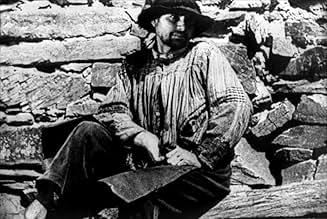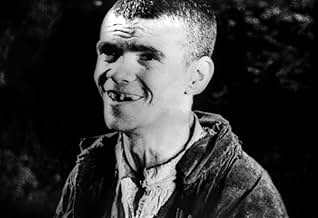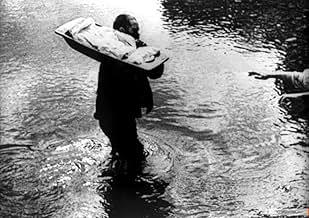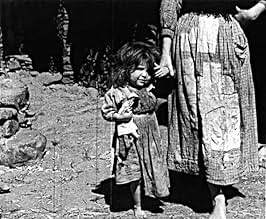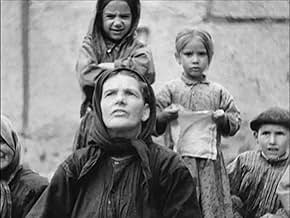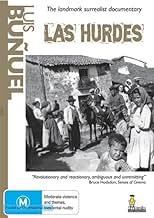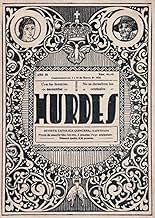AVALIAÇÃO DA IMDb
7,3/10
6,5 mil
SUA AVALIAÇÃO
Nesta docuficção, os habitantes da região montanhosa de Las Hurdes, na Espanha, são mostrados em sua extrema pobreza e isolamento.Nesta docuficção, os habitantes da região montanhosa de Las Hurdes, na Espanha, são mostrados em sua extrema pobreza e isolamento.Nesta docuficção, os habitantes da região montanhosa de Las Hurdes, na Espanha, são mostrados em sua extrema pobreza e isolamento.
- Direção
- Roteiristas
- Artistas
Avaliações em destaque
I have been frustrated by the version of the film that is available in my area, entitled "Unpromised Land". The original "Tierra sin Pan" has a completely different commentary which is made "politically correct" in the "Unpromised" version. Avoid "Unpromised Land" as it censors and alters the original intent of the film as conceived by Bunuel!
10groveman
I found it very interesting reading the reactions of others here, from interpreting this as everything from a pure comedy to a pure documentary. The truth is that it denies classification, and for many that just simply does not compute. Therefore, it has obviously done exactly what Bunuel wanted.
The aim of surrealism is to lure you in with the trap of a conventional narrative, and then hit you right in the face with something impossible to just passively accept. This film is the perfect example of this. You are absolutely forced into the role of active observer; forced to draw your own conclusions. Independent thought is pulled to the surface, returning comprehension to it's original purity. Reality lies not in what you are seeing, and not in what you are hearing, but somewhere in-between.
My God, this man was a genius, and so far ahead of his time it's unbelievable. Spielberg shows you what you want to see. Bunuel shows you what you need to see. Find this film and see it. Its value is incalculable.
The aim of surrealism is to lure you in with the trap of a conventional narrative, and then hit you right in the face with something impossible to just passively accept. This film is the perfect example of this. You are absolutely forced into the role of active observer; forced to draw your own conclusions. Independent thought is pulled to the surface, returning comprehension to it's original purity. Reality lies not in what you are seeing, and not in what you are hearing, but somewhere in-between.
My God, this man was a genius, and so far ahead of his time it's unbelievable. Spielberg shows you what you want to see. Bunuel shows you what you need to see. Find this film and see it. Its value is incalculable.
After Un Chien Andalou and L'Age d'Or had caused such earthquakes, Bunuel picked for his next project a documentary on the Hurdanos. These people live in mid-western Spain, near the border of Portugal, under the most horendous conditions possible. They are a primitive, almost neolithic people, who only barely understand the principles of farming and are otherwise so superstitious as to starve themselves rather than eat any animals besides disease-carrying pigs.
Now, it is difficult to know how to take this film. Following Un Chien Andalou and L'Age d'Or, I personally expected a comedy, and took it as that when I was watching it. If you read down, you will notice the first person who commented on the film takes it this way. My reasoning went thus: Bunuel saw the Hurdanos in his peculiar surrealist light. Here was a people degraded to the point of utter absurdity. For instance, there is a scene where the farmers are working in a place where adders are plentiful. The adders frequently bite them, but these bites are not fatal. They would eventually heal, but these people don't know that. Instead, they use a kind of ointment to cover the wound, and this treatment actually leads to infection, which eventually mangles or even kills them. In another scene, we are told that the children only know bread from the bits that the local church gives them. They are not allowed to take these bits of bread home because their parents don't trust bread, and will confiscate it and toss it out (this is what I read in an essay about the film; the version I watched had an English voiceover, whose explanation for the parents' actions was to steal the bread for themselves. I believe that the version in the essay is the more correct one).
The surrealist aspects of the scenes I mentioned are there. But, reading that aforementioned essay (and a second), I realize that I was wrong about the humor. Surrealism, you should note, does not = comedy. This is a more serious surrealism. In fact, Bunuel made the documentary as a political statement, showing how the Spanish government treated its people (in fact, he was wrong on this point; Franco idolized the area and had great sympathy for the people, believing them to represent the primitive aspects of Spain; in later decades, he would pour a lot of money into the region). It caused an upset, though not as much as the previous two films. I imagine that people then didn't know how to take it either, since many critics were up in arms over this apparently massive change in Bunuel's style. Nowadays, Las Hurdes seems better than ever before. It is an amazing documentary, and the people represented in it deserve our sympathy. I wonder if their lives have now changed. 9/10.
Now, it is difficult to know how to take this film. Following Un Chien Andalou and L'Age d'Or, I personally expected a comedy, and took it as that when I was watching it. If you read down, you will notice the first person who commented on the film takes it this way. My reasoning went thus: Bunuel saw the Hurdanos in his peculiar surrealist light. Here was a people degraded to the point of utter absurdity. For instance, there is a scene where the farmers are working in a place where adders are plentiful. The adders frequently bite them, but these bites are not fatal. They would eventually heal, but these people don't know that. Instead, they use a kind of ointment to cover the wound, and this treatment actually leads to infection, which eventually mangles or even kills them. In another scene, we are told that the children only know bread from the bits that the local church gives them. They are not allowed to take these bits of bread home because their parents don't trust bread, and will confiscate it and toss it out (this is what I read in an essay about the film; the version I watched had an English voiceover, whose explanation for the parents' actions was to steal the bread for themselves. I believe that the version in the essay is the more correct one).
The surrealist aspects of the scenes I mentioned are there. But, reading that aforementioned essay (and a second), I realize that I was wrong about the humor. Surrealism, you should note, does not = comedy. This is a more serious surrealism. In fact, Bunuel made the documentary as a political statement, showing how the Spanish government treated its people (in fact, he was wrong on this point; Franco idolized the area and had great sympathy for the people, believing them to represent the primitive aspects of Spain; in later decades, he would pour a lot of money into the region). It caused an upset, though not as much as the previous two films. I imagine that people then didn't know how to take it either, since many critics were up in arms over this apparently massive change in Bunuel's style. Nowadays, Las Hurdes seems better than ever before. It is an amazing documentary, and the people represented in it deserve our sympathy. I wonder if their lives have now changed. 9/10.
...from Spain and provocative director Luis Bunuel. The people of the Las Hurdes region of Spain are shown in all of their starving and impoverished misery. Located roughly 60 miles from the well-off Province of Salamanca, Las Hurdes is rampant with disease and malnutrition. The camera captures the look of loss and hopelessness on the emaciated children's faces, and we see as they drink from a filthy river and eat meager portions of bread. This stuff is pretty raw, but there's a dispassionate distance courtesy of the matter-of-fact English-language narrator on the version I watched. There's also a couple of rough animal scenes (a goat falls down a cliff, and a donkey is killed by bees) that may be a deal breaker for some viewers. It is listed as one of the 1001 Movies to See Before You Die.
Bunuel had always been a visionary man,his cinema had never stopped trying from "un chien andalou" to "le fantôme de la liberté"."las Hurdes " was a documentary ,but it made the genre explode.And,to think it was seventy years ago!
Near the Portuguese border,there's a part of Spain where a doomed humanity used to live.The beginning of "las hurdes" deals with a feast in a village,last stop before the Hurdes country.
Then Bunuel begins his unthinkable depiction of this subhumanity:morons,maimed persons,monsters with twelve fingers,living in a filth you could not imagine.They drink in the brook/sewer!Springtime which everybody enjoys elsewhere is the worst season for the "Hurdes":all that remains for them to eat is cherries.But they cannot wait that they ripen,so they contract dysentery and they fall like flies.
And ,however,in a world that God seems to have completely forgotten,the children learn at school that the sum of the angles of a triangle is 180 degrees.And chiefly,they must respect the property of others(!). On the wall of the classroom,you can see a picture,showing an eighteen century marchioness!
Irony and surrealism are always here .After these horrors,out of the blue,Bunuel begins a lecture on the anopheles mosquito,complete with anatomical charts.
Banned by the Spanish government in 1933-1935,it took the Popular front(1936)to release what was the first social and political documentary.
Near the Portuguese border,there's a part of Spain where a doomed humanity used to live.The beginning of "las hurdes" deals with a feast in a village,last stop before the Hurdes country.
Then Bunuel begins his unthinkable depiction of this subhumanity:morons,maimed persons,monsters with twelve fingers,living in a filth you could not imagine.They drink in the brook/sewer!Springtime which everybody enjoys elsewhere is the worst season for the "Hurdes":all that remains for them to eat is cherries.But they cannot wait that they ripen,so they contract dysentery and they fall like flies.
And ,however,in a world that God seems to have completely forgotten,the children learn at school that the sum of the angles of a triangle is 180 degrees.And chiefly,they must respect the property of others(!). On the wall of the classroom,you can see a picture,showing an eighteen century marchioness!
Irony and surrealism are always here .After these horrors,out of the blue,Bunuel begins a lecture on the anopheles mosquito,complete with anatomical charts.
Banned by the Spanish government in 1933-1935,it took the Popular front(1936)to release what was the first social and political documentary.
Você sabia?
- CuriosidadesLuis Buñuel was not above slaughtering several animals to deliver his message; he ordered the ailing donkey to be spread with honey so he could film it being stung to death by bees. Nor was the mountain goat falling off the mountain an accident, shot by Buñuel's crew for the desired sequence.
- Erros de gravaçãoIn the sequence where the mountain goat falls to its death, a puff of smoke can be seen on the side of the screen. This is from a gunshot by a crew member, who shot the goat so that it would fall and be filmed as if it 'accidentally' fell off of the mountain.
- ConexõesFeatured in Histoire(s) du cinéma: Les signes parmi nous (1999)
Principais escolhas
Faça login para avaliar e ver a lista de recomendações personalizadas
Detalhes
- Data de lançamento
- País de origem
- Idioma
- Também conhecido como
- Land Without Bread
- Locações de filme
- La Alberca, Salamanca, Castilla y León, Espanha(main town, on location)
- Empresa de produção
- Consulte mais créditos da empresa na IMDbPro
- Tempo de duração30 minutos
- Cor
- Mixagem de som
- Proporção
- 1.37 : 1
Contribua para esta página
Sugerir uma alteração ou adicionar conteúdo ausente

Principal brecha
By what name was Terra Sem Pão (1933) officially released in Canada in English?
Responda
